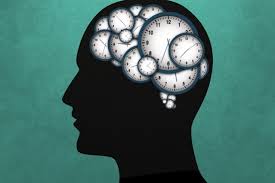 At the recent “Science of Consciousness” conference, A session raised the question of what role time plays in conscious experience and this struck me as input for a psi-fi story.
At the recent “Science of Consciousness” conference, A session raised the question of what role time plays in conscious experience and this struck me as input for a psi-fi story.
Mental experience does flow in time. Thoughts come in order, not all at once. In addition, one thought can cause another, it seems. Thought A causes thought B in some non-physical mode of causality we do not understand.
American philosopher William James talked about the “stream of consciousness” in his still well-regarded “Principles of Psychology” of 1890, and we use that expression even today, in literature, for example. Thoughts float along the stream, coming from where, we do not know, and disappearing into some ocean uncharted. The ‘ego,’ James said, watches them go by.
Imagine a mind, an alien mind perhaps, that had no stream of consciousness. Maybe it would be like a kaleidoscope, random thoughts all at once, no sequence, no logical connection, no sense of direction or flow. The aliens would not believe a stream of consciousness could exist. They could hardly understand the idea.
How could you live like that? You might be a good poet or artist. You’d see everything at once. You’d think multiple thoughts at once, in no logical order. Maybe that’s how it is for people who have trouble expressing their thoughts. But it would be normal for these aliens.
You wouldn’t be much good at planning, because that requires that things happen in a certain order, in a flow. And you wouldn’t be able to make sense of history, because stories are sequential: X happens, then Y happens. You couldn’t play music in the way we understand it, but maybe there would be some other kind of music.
How would these aliens get along without a time-directed flow of consciousness? I imagine they would need some kind of down-time where they sorted out experience and reconstructed it in a temporal order. We do that. Often we can’t make sense out of experience until afterward, when we’ve had time to “reflect,” or construct an explanation.
The philosopher Hegel coined the phrase, “The Owl of Minerva only flies at night.” Owls are very wise, of course, because they ask, “Who? Who?” all night. But only at night. During the day, they’re presumably too busy catching mice to interrogate their experience.
Hegel’s thought was about history. You can’t understand history except in retrospect, never while it’s happening. That’s how I imagine it would be for the streamless aliens. They would be stupid, unthinking, and instinctive during their active period, then later (at night?) during their quiet time, they would reconstruct their experience into logical stories.
For the humans who encountered these aliens, it would be a culture clash. The aliens would seem like idiots at first, but at other times they would be geniuses. Different groups of scientists would have different assessments, depending on when the observations were made. The danger to the humans would be in underestimating the aliens or overestimating them by assuming they were “just pretending” to be stupid at times.
There are story implications. The invasion? The colonization? The generational space ship? Romance? Chess? And what would the aliens think of the humans’ astounding continuous stream of consciousness (when it wasn’t totally blacked out by sleep)?

https://wronghands1.com/
I think this idea also implies a new method for time travel. What would time travel mean if you didn’t think in terms of stream of consciousness? If all events are perceived as simultaneously now, time travel is undefined or trivial. You just move from experience A to experience B, regardless of time frame because everything’s all at once.
Seems to me these aliens would be time jumpers, from the human point of view. They live outside of time during the day, but inside time at night.
The stream of consciousness not an idea I’ve ever seen developed in a sci-fi story, and it’s about as psi-fi as you can get – an exploration of human psychology in the context of a technological world, in this case an alien world.